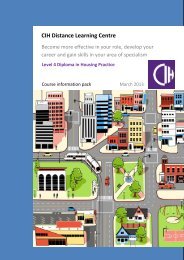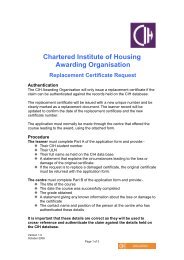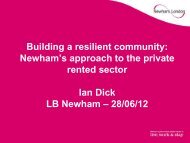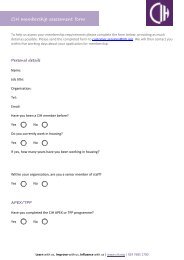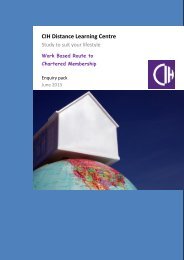View publication - Chartered Institute of Housing
View publication - Chartered Institute of Housing
View publication - Chartered Institute of Housing
Create successful ePaper yourself
Turn your PDF publications into a flip-book with our unique Google optimized e-Paper software.
PART ONE: LEARNING TODAY<br />
My view is that, alongside establishing the purpose <strong>of</strong> actions and the principles behind<br />
them, we need to increase the hard technical knowledge base <strong>of</strong> housing staff and be<br />
less prescriptive about process. This will allow staff to use their judgement to deal with<br />
the variety <strong>of</strong> circumstances that customers present. It will help them to manage risk<br />
and to find creative solutions that fit the needs <strong>of</strong> the customer as opposed to<br />
consistently applying the same procedure to everyone on every occasion.<br />
Many organisations have also made the customer journey more complex by designing<br />
the service on the false assumption that the majority <strong>of</strong> issues are simple and can be<br />
dealt with by an unqualified and <strong>of</strong>ten undeveloped front line; leaving the more<br />
complex issues to be handed over to fewer more experienced <strong>of</strong>ficers. In fact I suspect<br />
that few issues are ever that simple, and a lack <strong>of</strong> technical knowledge makes even the<br />
most simple issues complex.<br />
What do your staff actually know?<br />
I am not sure that many organisations routinely evaluate the true knowledge base <strong>of</strong><br />
their existing staff and instead have developed their practice along the lines outlined<br />
above. I am arguing that we need to firstly evidence what our existing staff actually<br />
know, and develop training that delivers on the technical gaps. Extensive recruitment <strong>of</strong><br />
people with the ‘right behaviours and attitudes’ without a programme in place to<br />
develop their technical knowledge will compound the problem. Even the recruitment <strong>of</strong><br />
graduates needs some form <strong>of</strong> follow-up training and development focusing on the<br />
development <strong>of</strong> technical knowledge.<br />
This is a challenge however when we look at the knowledge <strong>of</strong> existing teams and how<br />
this can be raised over time. Historically, the CIH pr<strong>of</strong>essional qualification leading to full<br />
<strong>Chartered</strong> Membership <strong>of</strong> CIH has been seen as a long and intensive programme<br />
(reflective in size and duration with many analogous programmes leading to<br />
membership <strong>of</strong> pr<strong>of</strong>essional bodies operating in the built environment and community<br />
sectors). Uptake <strong>of</strong> programmes leading to CIHCM is not universal. It is not routinely<br />
asked for as an essential requirement for front line staff at recruitment and if it were I’m<br />
sure that many organisations would rapidly find themselves with a recruitment crisis.<br />
A majority <strong>of</strong> organisations cannot afford to send large numbers <strong>of</strong> staff on this<br />
qualification in any one year both in terms <strong>of</strong> cash or time. This situation has been made<br />
worse in recent years by hikes in tuition fees. On the other hand, few induction<br />
programmes or day training courses ever get past the basics. The extent to which staff<br />
understand or can apply the learning from these courses is probably not routinely or<br />
independently evaluated, except perhaps by increasing scrutiny by managers.<br />
38





